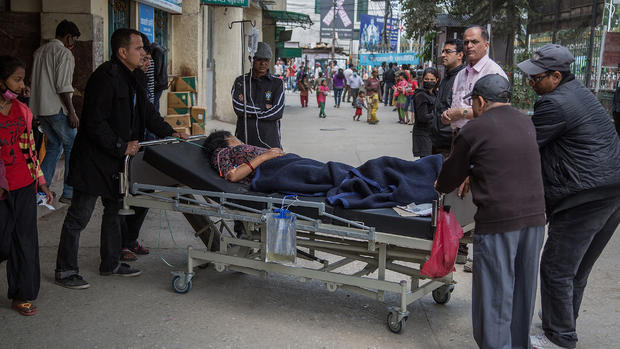Medical crisis in Nepal in earthquake aftermath
After a 7.8 magnitude earthquake hit Nepal on Saturday, international aid organizations are rushing to the area to deliver desperately-needed medical assistance. On Tuesday officials said the death toll topped 5,000, with that number expected to rise in the coming days, and more than 7,000 people have been reported injured.
Immediate medical concerns include treating the thousands who are injured with cuts and broken bones, common injuries in this type of disaster. Trauma and surgical supplies, such as scalpels and sutures, IV fluids, anesthetics, antibiotics and other infection-controlling medicines are critical right now, and the Nepalese government is severely lacking in these basic medical necessities.
Though it has been two full days since the quake, experts say there is still hope for finding survivors in the rubble. In similar disasters, "people have been pulled out of the rubble in three, four, or five days," Dr. E. Anne Peterson Senior Vice President of Global Programs at AmeriCares, a disaster relief organization that has sent an emergency team to Nepal, told CBS News. "Today is still a hopeful day. After that, we might get lucky."
Peterson said getting water to trapped survivors is especially important after an earthquake because the nature of crush injuries common in such disasters - caused by pressure from a heavy object onto a body part - is very dangerous. "Of course, the person would need to be concerned about whatever limb was crushed, but it also does very specific things to the body," she said. "All those crushed cells release electrolytes into the blood, which can lead kidney failure if the person is not well-hydrated."
Aid workers are also concerned about what happens in the days and weeks that follow. Rampant infection is feared as survivors crowd together in tents or open spaces without proper sanitation, spending nights outside because their homes have been damaged or they have a very realistic fear of aftershocks.
Another challenge could come if the water supply, which can be problematic under normal circumstances, becomes compromised. "We'll likely see a surge in diarrheal diseases," said Peterson, who is heading to Nepal Monday night to help with the relief efforts. The likelihood of such problems increases the longer people stay out of their homes, living in camps.
The most vulnerable populations, including children and the elderly, are at greatest risk of hypothermia from the cold and other illnesses from exposure to weather. Tetanus is another concern after such disasters. "If people have not been vaccinated for tetanus and get scratched by something rusty, that can be very dangerous," Peterson said. Respiratory infections are expected due to the inhalation of dust and ash. There may also be a rise in venomous snake bites, as reptiles may be dredged up as people search through rubble.
Aid agencies from across the globe have been starting to pour into Nepal to provide medical and disaster relief. While military units help with rescue efforts, Unicef is providing tents and blankets, as well as oral rehydration salts and zinc supplements for those who may be suffering from dehydration from diarrhea, according to a statement on its website. For its part, AmeriCares has sent an emergency response team from their offices in Mumbai, India, with medicine and relief supplies, and the group and plans to send more once clearance is given. Numerous other organizations have teams in Nepal or on the way.
On the ground, medical workers face logistical issues getting the aid to those who need it most, including traffic jams and landslides which can block drivers for hours at a time. Hospitals and clinics have also sustained damage. "Very early on, a huge problem is access to healthcare facilities," Peterson said. "The first thing to do is access the situation, repair damage in hospitals that can be repaired, and set up makeshift clinics that can be used to treat patients in the meantime."
Psychological distress is also a concern and counseling is being offered by medical personnel. "Responders are aware of psychological grief and are offering support," Peterson said. "The first step is to get these people somewhere safe. Right now they're still out on the streets. Their trauma isn't even over until we can get them into a safe place where they will no longer fear for their life. Then we can work to treat their psychological grief."
